A Love Letter to a Love That Never Was
As I was about to leave my parents' garden, I noticed a small hedgehog hidden in the leaves piled in a corner. There was no wind. Time seemed to be suspended. A void. This place, where I spent over 18 years of my existence, feels foreign each time I return. It's as if I am a stranger here. A stranger in a garden tucked away in a forgotten corner of Eastern Europe. A garden full of flowers. And tomato plants. A garden filled with the scent of freshly cut grass beneath linden trees. A garden full of birds, with no wind to stir the leaves. Only the distant sound of dogs barking at ambulance sirens breaks the silence. As I closed the gate behind me and navigated the narrow street lined with parked cars, a deep nostalgia surrounded me, accompanied by a sense of heartbreak for a love that perhaps never was. Yet, I have no lost love to mourn. Am I experiencing love, or merely its mimic? Dostoyevsky’s words on love and suffering echo in my mind, yet I question, how can I ache for what I have not known? Or have I? What exactly am I longing for? What was the object of my love?
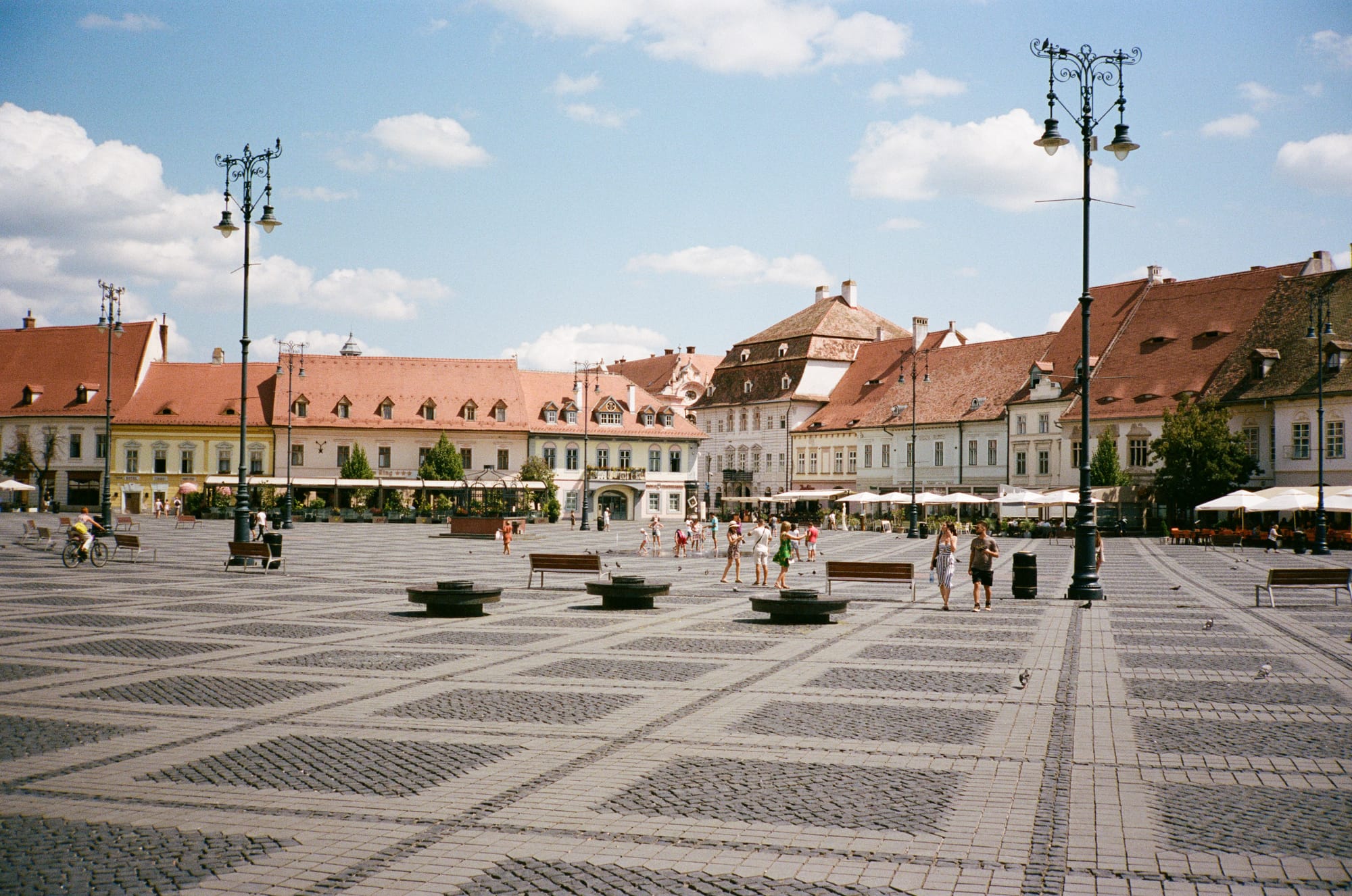
Sibiu (ger. Hermannstadt; hun. Nagyszeben) stands unchanged. Some buildings are refreshed. Some of them are crumbling. Some of them line on secluded alleys, untouched by time or modernity. Only the opening hours of the central post office, built in 1904, have been reduced. The building decays with each passing year, mirroring the aging faces of the women behind the counter, themselves unchanged by time. None of them have retired yet. I buy my stamps in silence and leave. Bookstores, cafés, and convenience stores appear untouched by time. In the lower town, the streets are lined with vibrant houses. Some large. Some small. All of them ancient. Sheltering the old. People and shops alike. Furriers, tailors, antiquarian bookstores. Inside one, I encounter an elderly man, possibly the owner. This was once Julius Kvanka Schneidermeister's workshop. The scent of old paper fills the air. I look at the books. Mihail Sadoveanu, Liviu Rebreanu, Fyodor Dostoyevsky. And many more. These books, like those in my grandmother's library, are relics of another era. Printed during communist times and rescued from oblivion. The elderly bookkeeper laments the dwindling interest in reading among the youth. He later reveals he has over 100.000 books in storage. Books that may never see the shelves—a grim reminder of Romania’s status as the EU member with the fewest active readers.
I leave the antiquarian and walk up to the Ursulines Convent (Ursulinenkloster), where I spent my early school years. Nora Iuga, from a generation long before mine, once sat on these same benches as the Second World War was taking Europe by storm. Passing by, I am haunted by her love letters to Sibiu. I reflect on her suffering from a love that never reached the depth she yearned for. Months ago, I gifted Sexagenara și tânărul (Die Sechzigjährige und der junge Mann) to a friend—the only edition in German I found. I'm still waiting for his review. Now, the school of our shared past lies in ruin. Shattered windows. Bolted doors. Extinguished lights. The inner courtyard, overgrown with vegetation, leaves no trace of the former school, except for the Salve inscribed above the entrance.
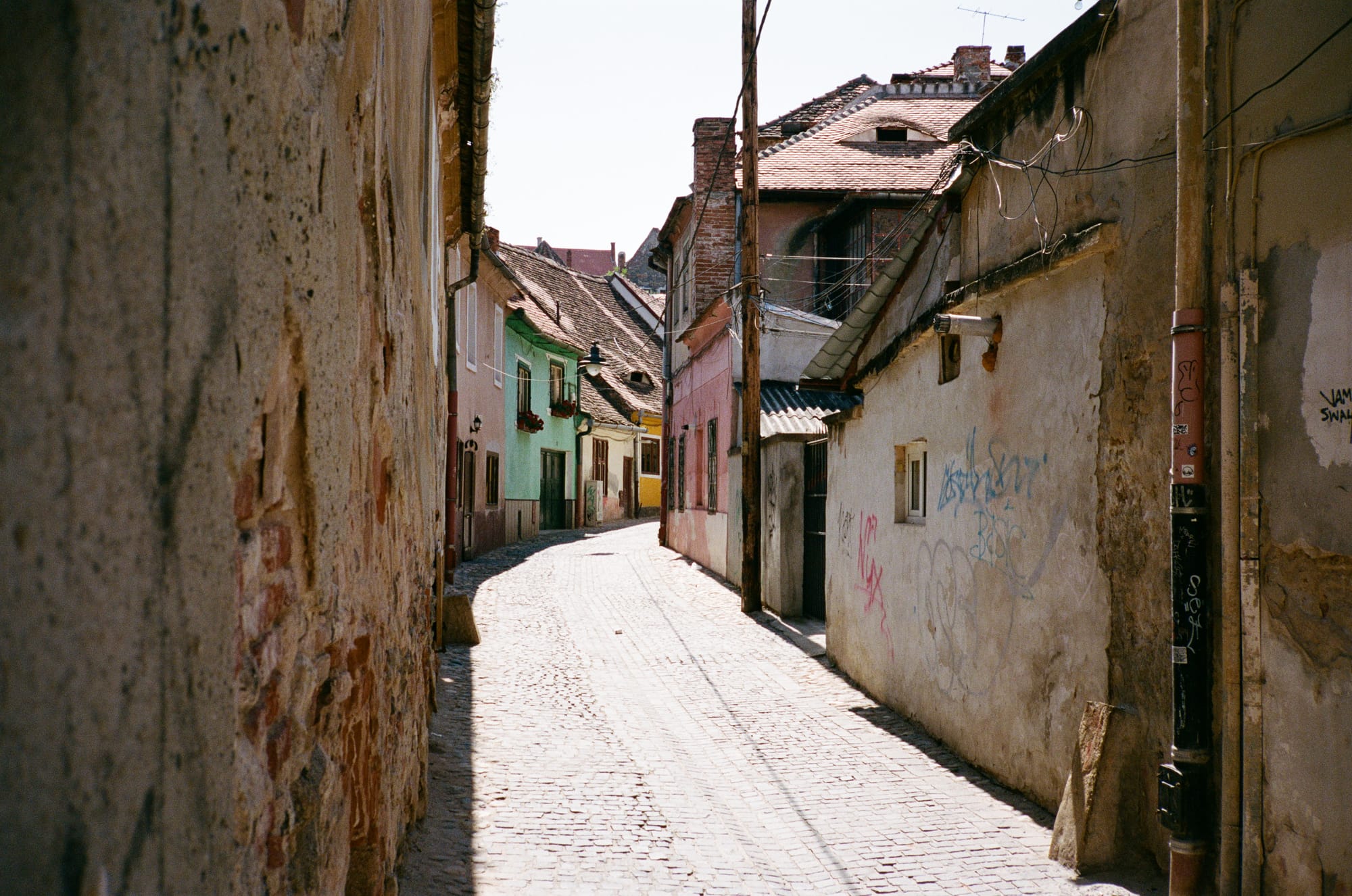
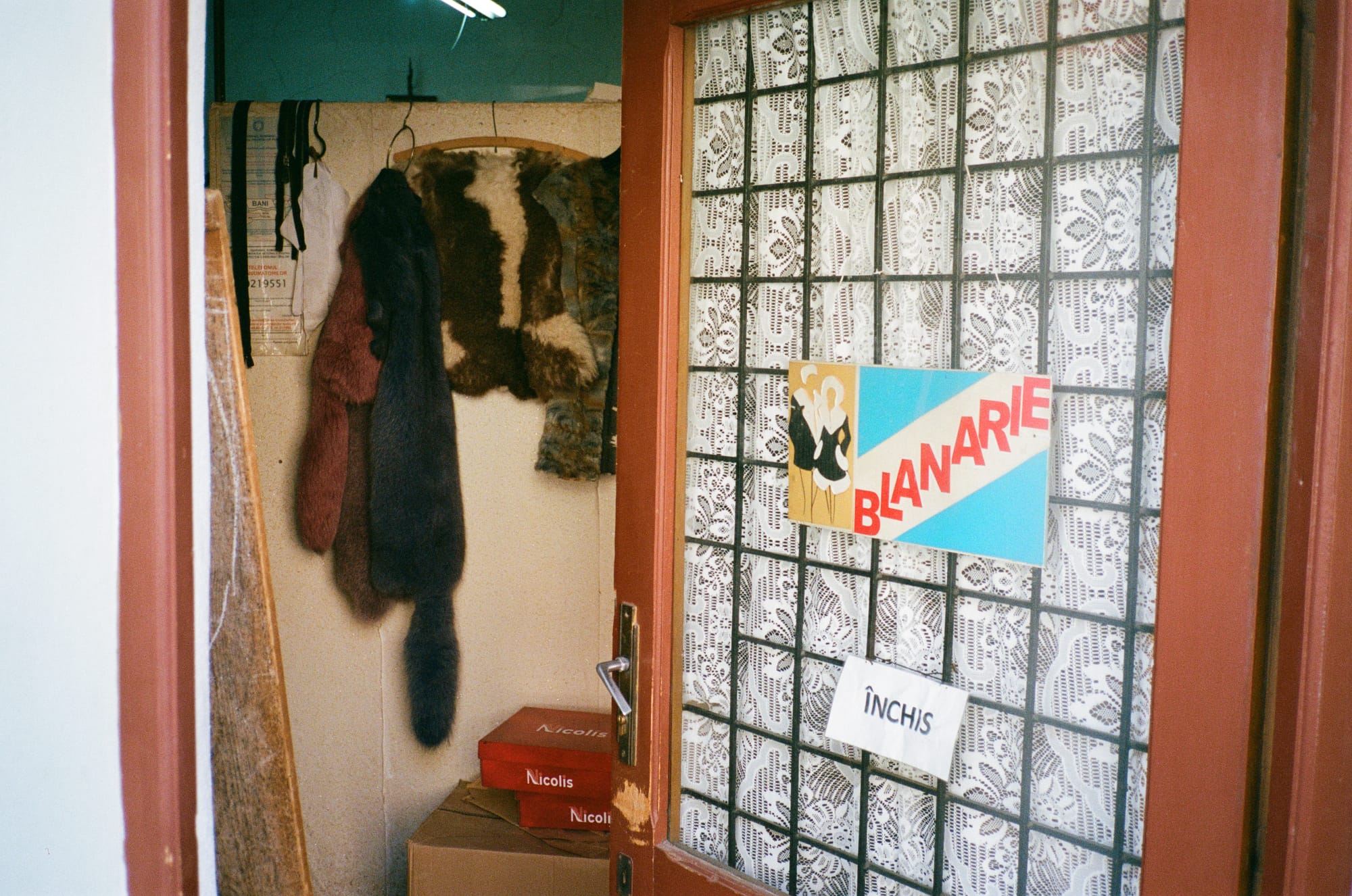
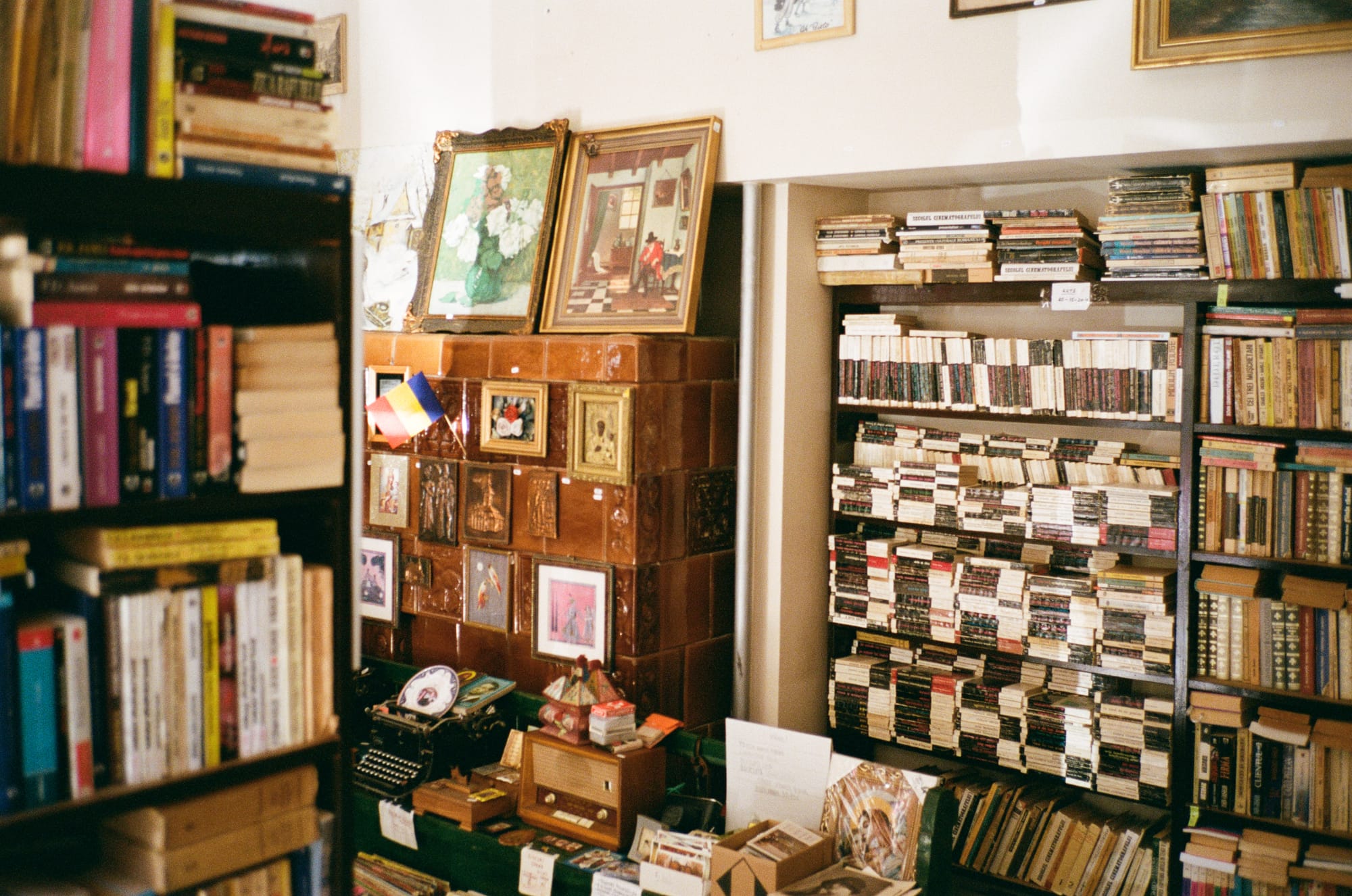
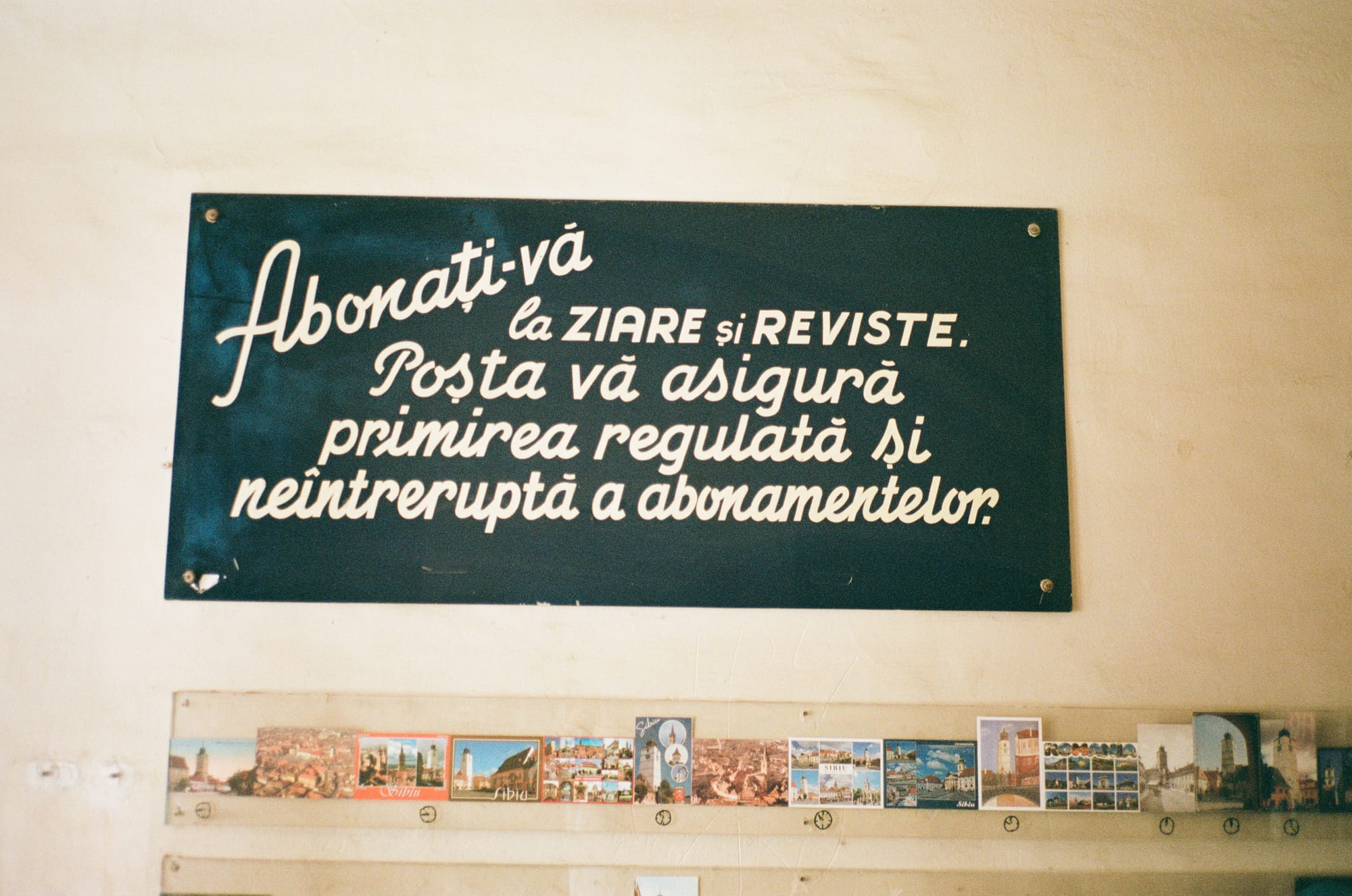
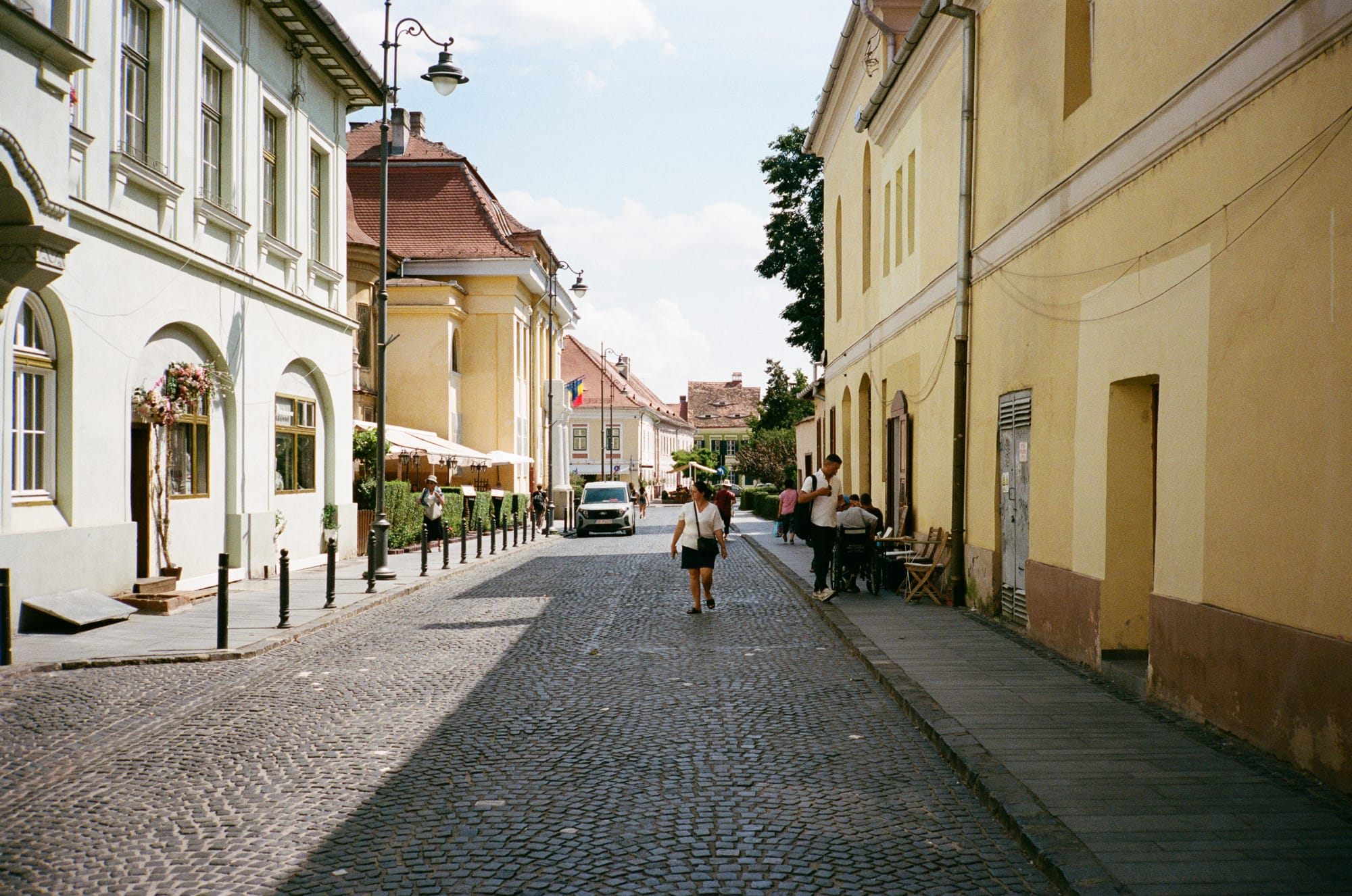
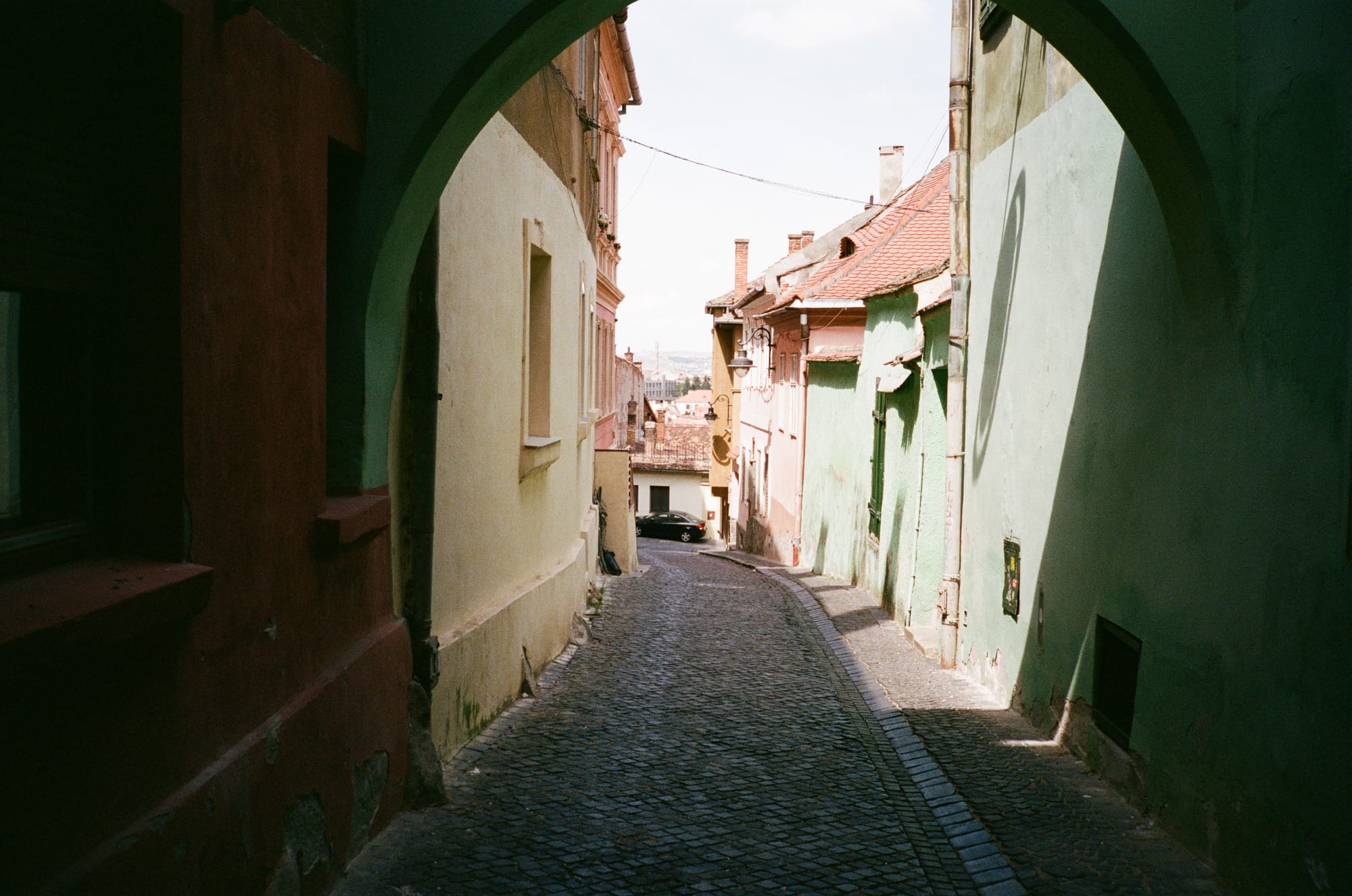
Scenes from Sibiu | Contax T2 | Kodak Portra 400
I waited for my memories to resurface. Long, dark hallways. The vast garden, encircled by the ancient city walls. The linden tree in the inner courtyard. The kiosk's microwave pizza with its sour ketchup. The auditorium where we danced. The carpeted classroom with its yellow walls. The warm smiles of our teacher. The way she wore her tailored blazers. The Madonna, overseeing from above the church entrance. These memories linger behind the red walls of what was once our school, now silent for fifteen years, its hallways abandoned.
The following day, I headed to Cetatea de Baltă (ger. Kokelburg; hun. Küküllővár). As the Transylvanian highlands bathed in the warm afternoon sun, I passed through villages, each holding stories of their inhabitants. I thought of Hanna, now over 80, living alone in a wheelchair in a small apartment in Sibiu’s upper old town. Born in the aftermath of World War II, Hanna's early life was marked by the Soviet occupation and its severe reprisals against the German minority. Her mother was deported to Siberia shortly after Hanna's birth, a fate shared by many. Rounded up and transported like cattle. A fate Herta Müller hauntingly describes in The Hunger Angel (Atemschaukel). The community was decimated. Families were torn apart. Many died along the way. Some of them returned. Many didn't. Hanna's mother eventually made her way back to Transylvania. But by then, Hanna was already in primary school, raised by grandparents she knew as parents. Her father had left right after her birth. She never met him. When Hanna finally faced her mother, she saw a stranger, not the mother she knew or hoped for. Hanna's life unfolded as a sequence of losses. Her mother to Siberia. Her husband to alcoholism. Her possessions upon emigrating to Germany in the 1980s, where she faced discrimination and struggled as a single mother in a society that often looked down on her. Ultimately, her sons distanced themselves from her. Later in life, she lost her partner to illness and her mobility to age. Yet, despite these hardships, Hanna retained her dignity.
Hanna’s story mirrors those of many Transylvanian Saxons who left their homeland seeking a new beginning away from the oppressive grip of the Socialist regime. Decades earlier, the Soviets decimated their community. Now, they searched for a home in Germany—a home that turned out to be illusory. They felt alienated, labeled Zigeunerdeutsche. They were outsiders in a supposed refuge—a place as foreign as the home they had left. Meanwhile, the land they left was forever altered, sealed off and inaccessible, no longer the home they remembered. It had become just a distant echo of their past.
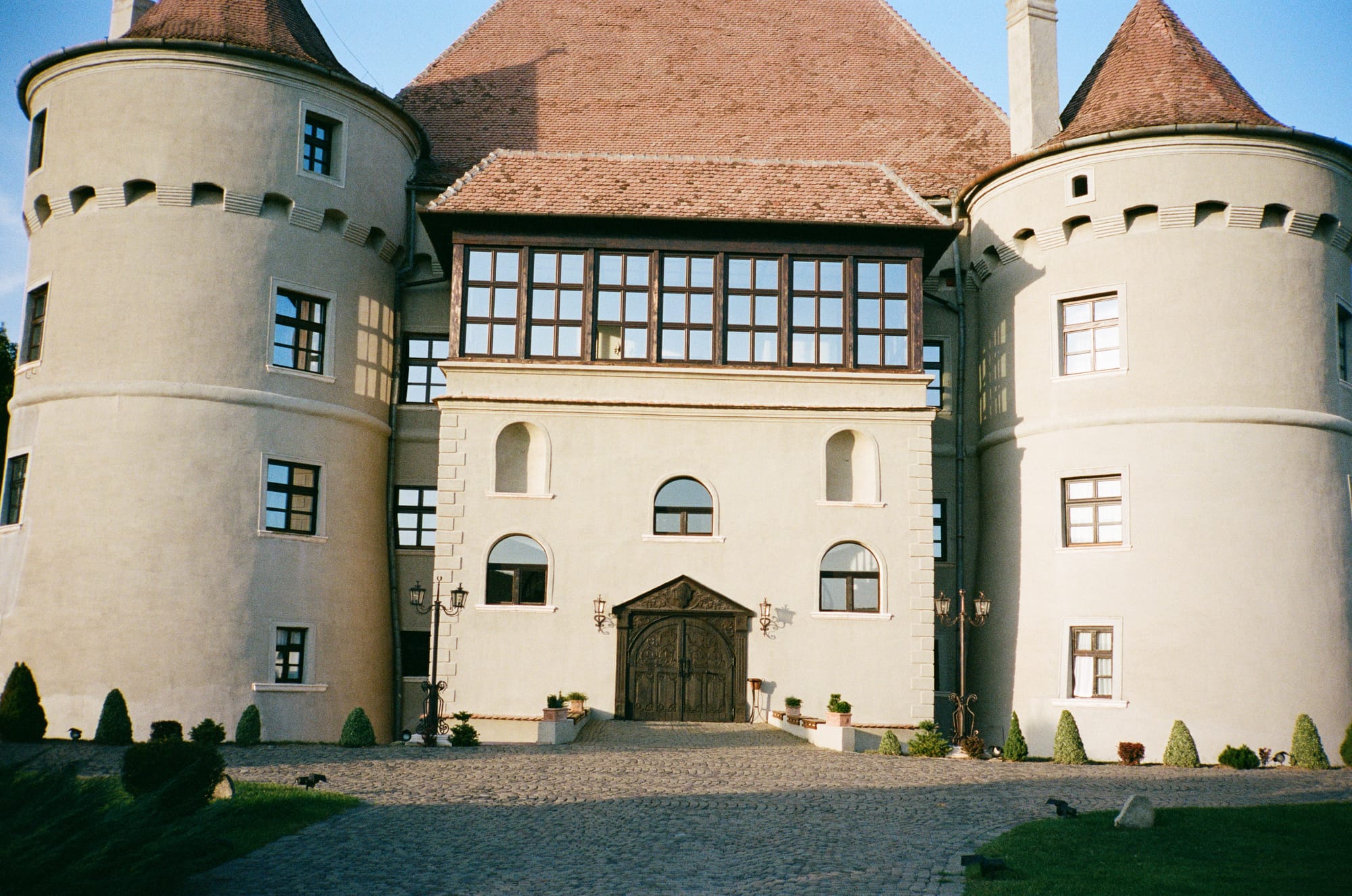
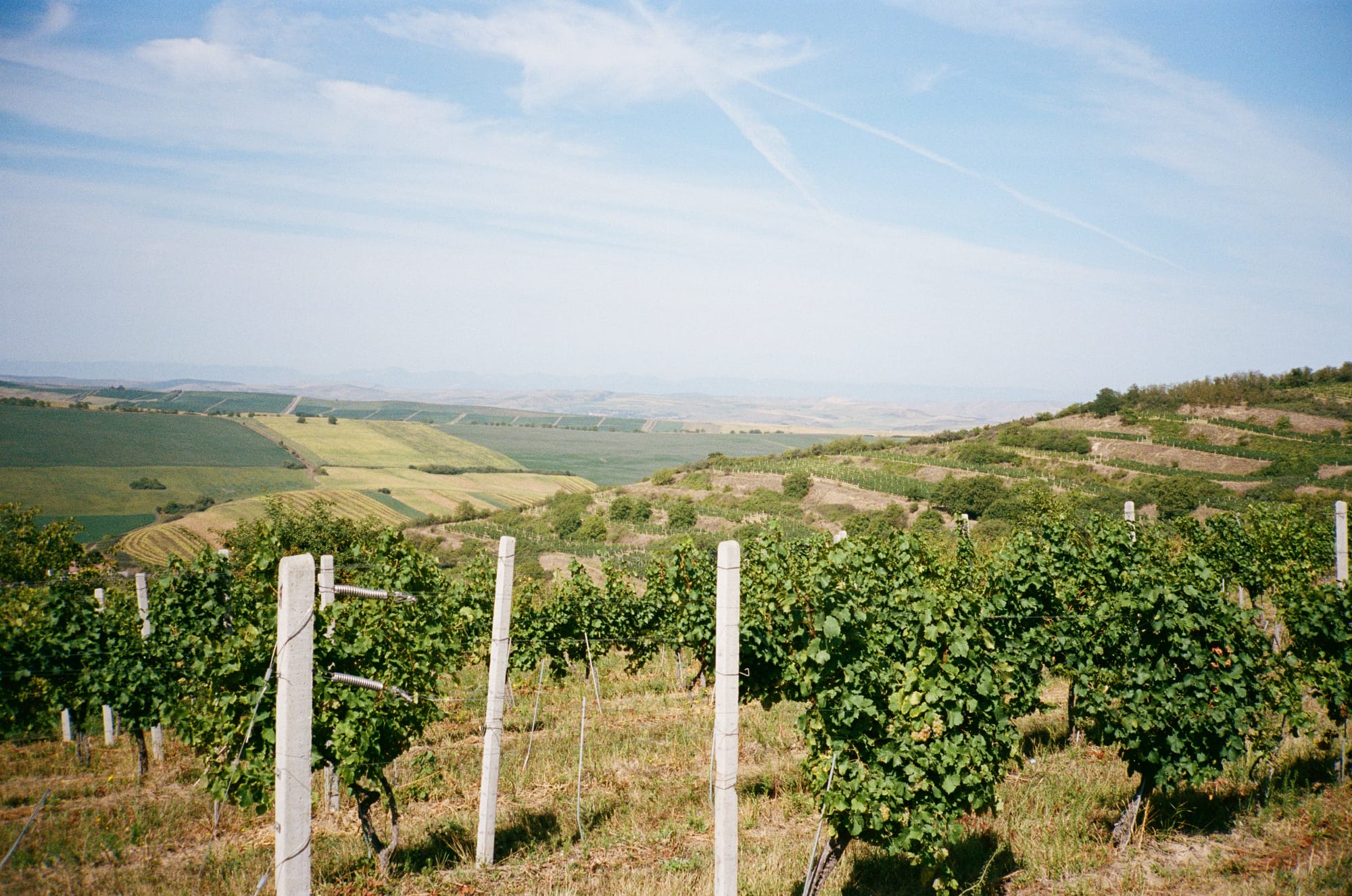
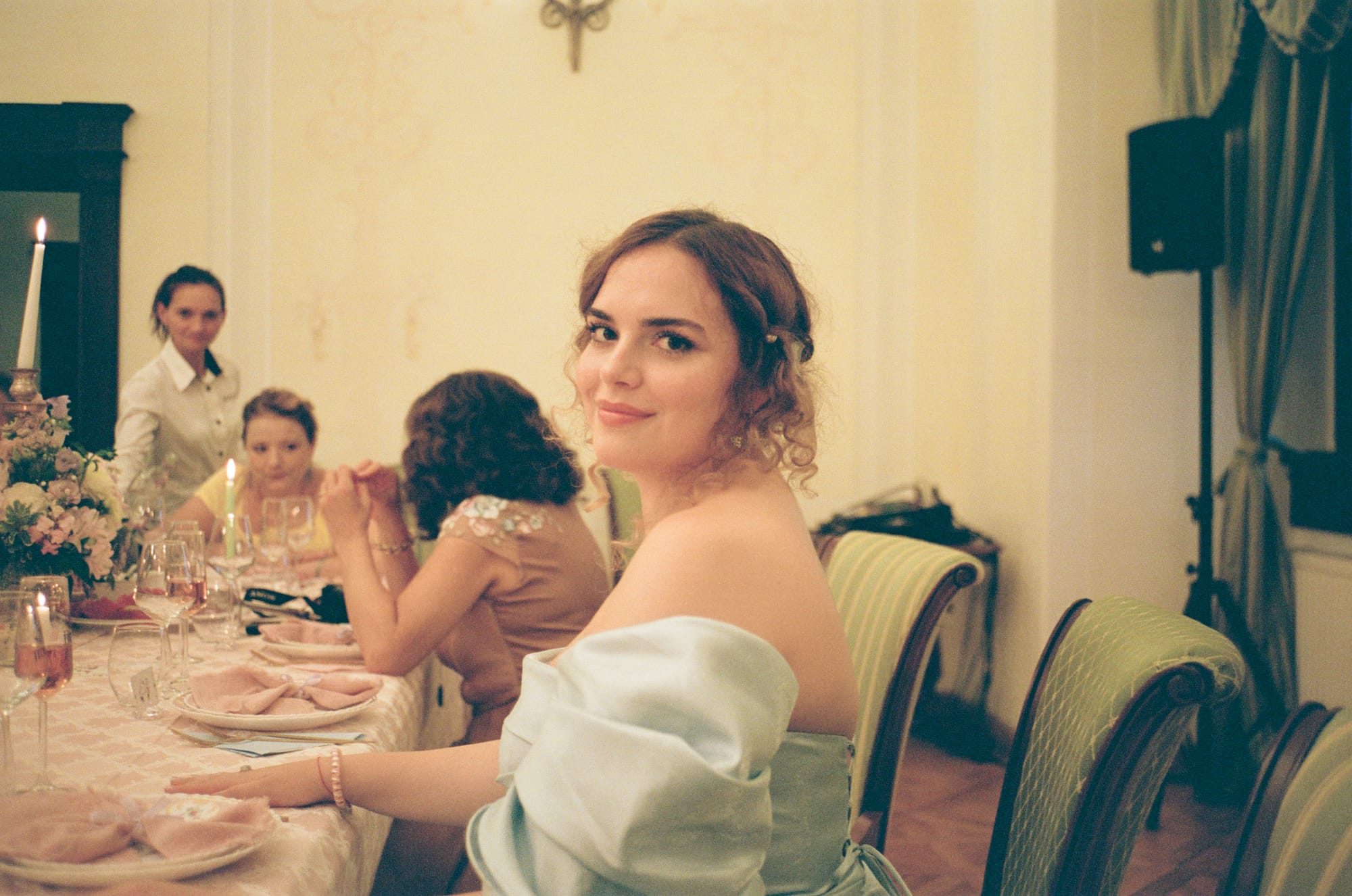
Bethlen-Haller Castle and my host, Arina | Contax T2 | Kodak Portra 400
Upon arriving at the Bethlen-Haller Castle, I was greeted by a golden sun. Perched atop a hill outside the village, the castle, built in French Gothic style, overlooked vast fields of grapevines—I was in the heart of the Târnava (ger. Kokel; hun. Küküllő) wine region. As I sipped white wine, my thoughts wandered off. What was the object of my inexplicable love? A person? A close friend? Or merely unmet expectations and unreciprocated feelings? The past? My identity? Myself? Amid the vineyards, I confronted the reality of my experiences: failed emotional investments, dashed hopes, and broken trust. I mulled over the fate of the castle, plundered by the workers of the IAS (state agricultural enterprise) Jidvei during communist times, its former degradation a testimony of greed and ignorance. This mirrored my own desire for clarity. Had I imagined a love that never truly existed? Was my disappointment rooted in reality or self-deception? I am reeling, breaking away from an illusion I had crafted. This is a love letter to a love that never was.
Back in Sibiu, my grandma awaited me. Her cooking felt like a comforting hug. We talked. About her past in the Soviet Union. Her encounters with the border guards. Her arrest by communist police. She recounted her struggles. We delved into my present and future. She had new stories too, about transgender teens she’d read about on her iPad. She spoke of her friends, aging and passing away. We talked about loneliness. About exodus. When it was time to leave, I said goodbye. Her eyes filled with tears every time I walked away.
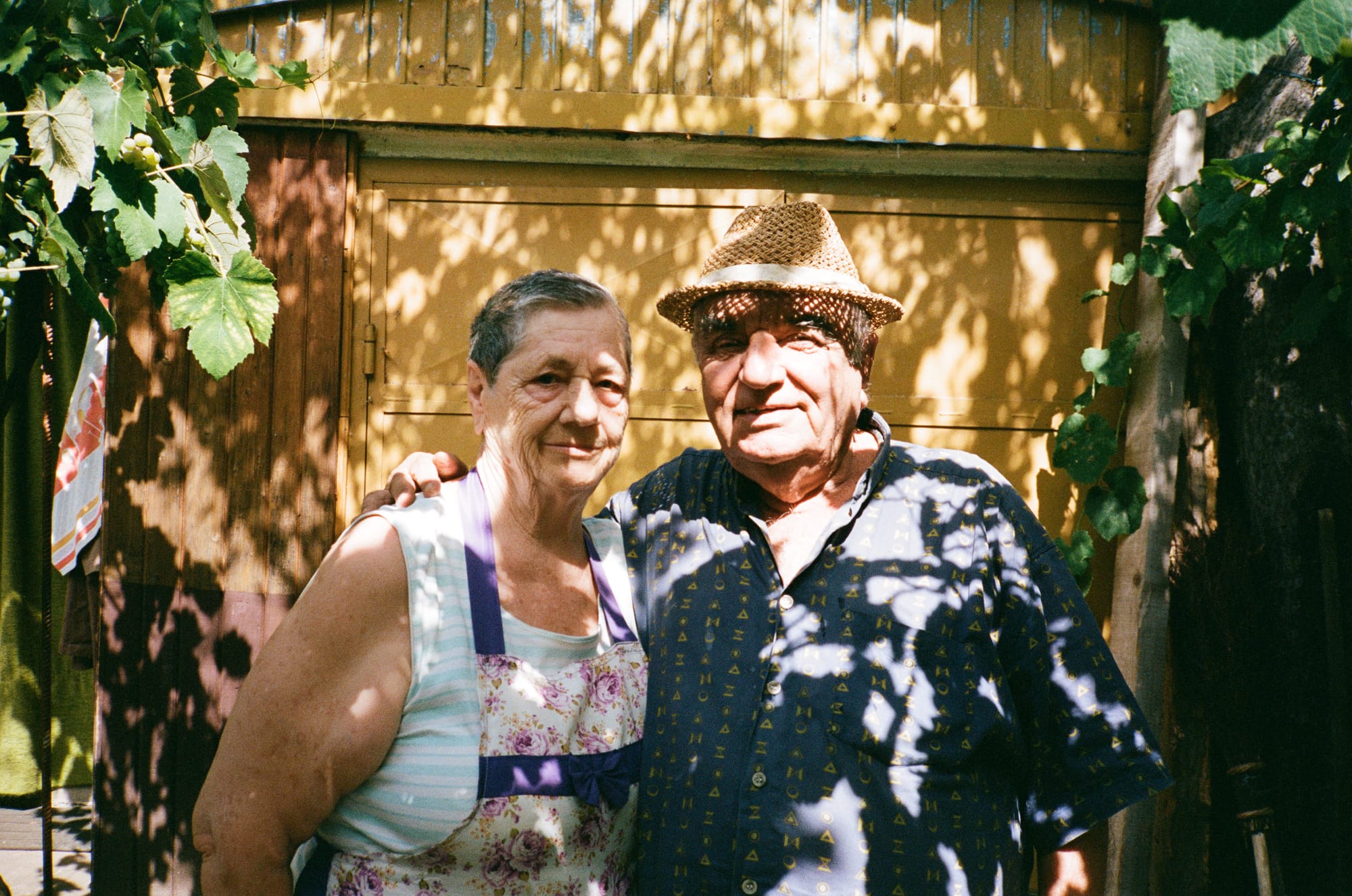
Before leaving, I took one last walk. I passed by the empty Synagogue. Its doors shut. Surrendered to nature’s reclaim. A silent witness to the town's once-diverse spirit. At Theresianum, an imposing bust of the empress presided over an abandoned and crumbling orphanage. In the 1990s, Western viewers glimpsed through grainy broadcasts on PAL and SECAM the shadows of children institutionalized behind the Iron Curtain. This exposure did little to foster empathy. Instead, it cemented a sense of Western superiority, reinforcing a narrative of Eastern European backwardness.
My early days at university in Zurich were marked by such perceptions. Questions about the bleakness of Romanian orphanages as if they were curiosities from another world, not realities of human suffering. This is the narrative of the new East—freed, yet held to impossible standards. Its rich culture overlooked. Its literature ignored. Geopolitically abandoned. Condemned for joining NATO. Perpetually misunderstood. Its people dismissed as beggars. Thieves. Swan eaters (Austria, 1990 and 2003). These labels were as grim as the landmarks I passed: the stone bridge and the Rieger Halls, once jewels of the industrial era, now mere eyesores.
The city, like me, is caught at a crossroads between a past it cannot fully embrace and a future it cannot fully comprehend. It embodies this paradox. A European Capital of Culture, yet full of decaying landmarks. A place of scientific excellence, yet faced with dwindling PISA scores. An exodus of historical minorities, yet with rising domestic migration.
The road to the airport leads through Turnișor (ger. Neppendorf; hun. Kistorony), the neighborhood of my early childhood. I remember the Saxon wagon home with its large garden. A garden bursting with roses my grandparents brought from Ciumbrud (ger. Poley; hun. Csombord). A garden shaded by plum trees. I remember the barn full of agricultural tools, and chasing As, the neighbor’s German Shepherd—the only dog I've ever loved. A dog I loved more than anything.
Weeks before my return, the Saxons who once called Transylvania home gathered here for their annual Sachsentreffen, returning to a homeland they had exchanged for the promise of a "better" life. A life they purchased with their possessions. A life subsidized by Germany which, in turn, financed Communist Romania for each émigré permitted to leave. Yet, this was a life disconnected from their roots. A life they would now readily abandon for a chance to revisit a home that had moved on without them.
As I prepare for takeoff, I find myself reflecting on Tonio Kröger, the protagonist of Thomas Mann’s eponymous short story. My previous disdain for the story perhaps stemmed from an unwillingness to confront the parallels between his life and mine. I have judged the Transylvanian Saxons for abandoning their ancestral homeland, yet how am I different? Perhaps I am even more culpable. I left as soon as I could. They at least stayed long enough to leave a mark. I left Transylvania, only to return as a stranger years later. My heart is torn between two worlds: the homeland I abandoned and the new life I attempt to establish in Switzerland. Have I forged meaningful ties there? Found a community? A circle of close people? Loved ones? Or am I as much an outsider there as I am here? Am I merely a ghost, belonging nowhere? Perhaps this is the love that never was. Or perhaps it’s about accepting my duality, much like Tonio Kröger.
I often find myself thinking about Hanna. About her struggles. About the moments shared at her home. I remember wearing her dresses, and how her Polish neighbor reacted with a prayer upon seeing me. Eating fries and chicken wings at 4 AM in her kitchen. Sleepwalking through her house. Hanna yearned to renovate her apartment in Sibiu and return. She eventually did, spending her final years in the place she felt she truly belonged. And I? Where do I belong? Maybe nowhere. Or everywhere. All at once.
To visit:
- Bethlen-Haller Castle at Cetatea de Baltă (ger. Kokelburg; hun. Küküllővár): for wine
- ASTRA Museum: for folk culture
- Brukenthal National Museum: for Romanian art
To eat:
- Plai: for fusion cuisine
- Crama Sibiul Vechi: for pișcăcioasă de vită and papanași
- The Kiosk in Cisnădioara (ger. Michelsberg; hun. Kisdisznód): for mititei with mustard
To recharge:
- Arhiva de Cafea și Ceai: for coffee and tea
- 5 Pâini 2 Pești: for bread and pastries
- House of Ellixirz: for cocktails
- NOD roastery: for coffee snobs
To buy:
- Anticariat Strada 9 Mai (ger. Elisabethgasse) Nr. 47: for old books
- B'ART Events & Flowers: for flower arrangements
- Schiller Buchhandlung: for postcards
On repeat:
- Lily – Joe P
- Found Somebody – Birskie
- Fairytale Gone Bad – Sunrise Avenue
- Midnight City – M83
- Allein Allein – Polarkreis 18
On streaming:
- Industry – Season 3 (on Max)
- Abbott Elementary – Season 3 (on Disney+)
- Only Murders in the Building – Season 4 (on Disney+)